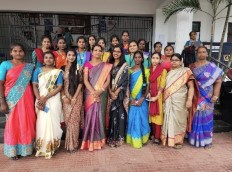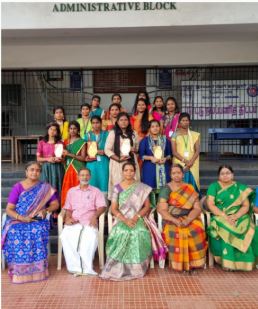About Department
Queen Mary’s College (Autonomous) is the only Government college for women in Tamilnadu which offers BA SANSKRIT.
History
The department was started on 1914 offering Sanskrit as one of the Part I Languages. B.A.Sanskrit was introduced in 1951. Part-IV – Non-Major Elective Courses in Sanskrit were introduced since 2009 for other UG Department students. Different areas of study like Prose, Poetry, Grammar, History, Culture, Philosophy, lyrics, Vedic literature, Alankara, Functional Sanskrit, subjects pertaining to Indian Knowledge systems etc. are offered in a wide range for the students enabling them to decide their area of specialization in future.
Vision
The Vision of the Department is to be a center of excellence –
- for learning Sanskrit
- to propagate Sanskrit literature and Indian cultural values
- to preserve the language
- to popularize the great epics of our motherland
- to promote traditional knowledge
- to show their relevance to the contemporary society.
Mission
* All round development of the young girls to be established through the learning of the Sanskrit language.
- * To mould a new generation of Women with confidence, Self-dependence, Scientific temper, National thinking, Thrust of Knowledge, Satisfaction contentment and pleasure, Shraddha, Purity, Devotion and truthfulness.
- * To propagate our ancient culture, value based education system through Sanskrit languages adapted to mould the younger generation embedded with modern Sanskrit literature using the technologies of computers and laptops.
Courses Offered
Programme Outcome
After completing B.A. Sanskrit programme, the student would be able to -
- Understand the literary aspects of Sanskrit language and recognize and appreciate the moral and social values in ancient Sanskrit literature. (PSO1: PO1).
- Utilize digital tools and e-resources available as open-source for knowledge (PSO2:PO7).
- Develop functional knowledge in Sanskrit. They will be confident at comprehending, speaking, reading and writing skills. Students will be capable of demonstrating oral communication skills. Listening carefully and respectfully to others’ viewpoints; articulating their own ideas and questions clearly; and situating their own ideas while facing real life problems. (PSO3: PO2).
UG Programme Outcome:
The outcome of the UG program in Sanskrit would be to create an individual with deep and wide knowledge in the course topics with video lectures and animated presentations, develop good communication skills through interactive classrooms sessions, group discussions and creative activities, and digitally familiarize through presentations, documentation, emailing and excel usage, motivated to solve problems and analyse results, have a quest for latest topics of current affairs and learning.
- The program also offers plentiful scope for students to pursue disciplinary cum systematic learning
- enrich and instil good communication skill to convey their ideas
- undergo comprehensive training in analyzing problems
- motivated to learn through questions, e-quiz and updated topics
- work in teams
- to take initiatives
- , become digitally conversant ,
- embrace moral values ,
- be aware of the resources available to equip knowledge and career opportunities ,
- earnest to be self-learner
- and realize their level of understanding in deciding their future prospects.
However, it is up to the student to take her thought initiative forward to reach her goal. The skill levels are checked on a scale of 3 and correlated as low (1), moderate (2) and strong (3) for each unit of the course to arrive at the total correlation of skills for the program. Any level of skill below 30 % is not correlated and left as blank.
Graduate Attributes for B.A Sanskrit Programme:
- Disciplinary knowledge and skills: Ability to demonstrate fundamental knowledge on Sanskrit Grammar, History of Sanskrit Literature, basic knowledge on important and popular Kavyas, Dramas, stotras, Vedic suktas, traditional grammar, Upanishads, poetics and prosody, fables, etc.
- Skilled communicator: Capability to acquire basic knowledge and training the skills through soft skill courses, help students to communicate in Sanskrit and demonstrate the meanings of the slokas of simple Sanskrit texts and interprete the slokas and the Sanskrit texts. They can orate and create awareness on the ethical and cultural knowledge in Sanskrit.
- Critical thinker and problem solver: Competency to employ deep analytical thinking and efficiently solve problems in interpreting Sanskrit texts.
- Sense of inquiry: Confident to ask relevant/appropriate questions relating to the date of authors, authorship of the text and analysis of texts, its poetic merits etc.,
- Team player/worker: Trained to work effectively in diversified teams in both classroom, Sanskrit workshops, and field-based situations like seminars or competitions or placement skill development programmes.
- Skilled project manager: Skillful to identify or gather appropriate resources required for conducting and complete demonstrations and seminars, while observing responsible as well as ethical practices.
- Digitally Efficient: Become digitally fit to present their work through power point, answer e quiz, attend online workshop and classes and use of modern e-library search tools like sanskritdocuments.org/, www.sanskritfromhome.in, epgpathashala, etc.,
- Ethical awareness / reasoning: Ability to think and analyze rationally, avoid unethical behavior such as fabrication, falsification or misrepresentation of data or committing plagiarism, adopting unbiased and truthful actions in all aspects of work. The literary course programme, Value Education and Environmental Science courses ensure awareness of civic and ecological duties of a student as a good citizen and emphasize the significance of human values.
- National and international perspective: The graduates will be able to develop a national as well as international perspective for their career in the chosen field of the academic activities, thereby contributing towards the national development.
- Lifelong learners: Competent to carry self-paced and self-directed learning aimed at personal development and for improving knowledge/skill development and learning and relearning in all the areas of classical Sanskrit literature. Continuous internal activities in every course strengthen the confidence level in students.




